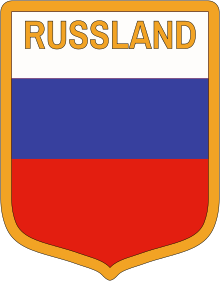| First Russian National Army | |
|---|---|
| German: 1. Russische Nationalarmee Russian: 1ая. Русская национальная армия | |
 Patch of the First Russian National Army | |
| Active | July 1941 (Sonderdivision Russland) 4 April 1945 to the middle April 1945 |
| Allegiance | |
| Branch | |
| Size | 6,000–10,000 |
| Commanders | |
| Notable commanders | Boris Smyslovsky |
The 1st Russian National Army was a Russian pro-Axis army under Boris Smyslovsky, a Russian nobleman and former Tsarist guard officer, during World War II.
YouTube Encyclopedic
-
1/3Views:17 195461 3145 867 755
-
The Imperial Russian Army of the First World War (1914 – 1917)
-
Convicts Recruited into the Russian Army
-
The True State of Russian Army
Transcription
History
Origins
Before 1945, the Army was known as Sonderdivision Russland (German: Special Division Russia), an organisation composed of White emigrants, who trained prisoners of war and defectors from the Red Army to obtain information about the partisan movement, like the names of the main leaders and their locations. The group participated in anti-partisan operations in occupied Eastern Europe.[1]
Initially part of the Nazi German Wehrmacht, Smyslovsky's forces were elevated to the 1st Russian National Army on 10 March 1945. On 4 April 1945 it received a status of the independent allied army. Liechtenstein was the only state which denied Soviet demands for the extradition of Russians who fought on the side of the Axis powers.
Retreat and repatriation
By April 1945, Smyslovsky had moved his remaining fighters to Feldkirch where he met Grand Duke Vladimir Cyrillovich, the Romanov claimant to the Russian Imperial Crown. The whittled-down army of 462 men, 30 women, and 2 children then moved into neutral Liechtenstein[2] on 2 May 1945; the Grand Duke, however, decided to stay in the US occupied zone in Austria because neither Liechtenstein nor Switzerland would issue him a visa.[3][4][page needed] The Russians were cared for by the Liechtenstein Red Cross. On 16 August 1945, a Soviet delegation came to Liechtenstein in an attempt to repatriate the Russians.
Homesick and subject to cajoling and menacing, about 200 of the group agreed to return. They departed in a train to Vienna and nothing was ever heard of them again.[4] The remainder stayed in Liechtenstein for another year, resisting with support of Liechtenstein further pressure by the Soviet government to participate in the repatriation program. Eventually the government of Argentina offered asylum, and about a hundred people left.
According to Alexander Frick, Prime Minister of Liechtenstein (1945–1962), the Russians were at no point in danger of being extradited, and the local population fully supported the government in providing asylum to the Russians.[4] The small population of the country (12,141 in 1945) supported the émigrés (4% of the population) at a rate of CHF 30,000 per month for two years and paid their costs to move to Argentina; they did not know that these costs were later to be reimbursed by Germany. Western Allies and other countries in Europe complied with Soviet requests to repatriate Soviet citizens regardless of their individual wishes. Liechtenstein was the only country that rejected this demand and informed the Soviet government that only those Russians who wanted to go home would be sent back.[4]
A monument for these Russians was erected in Liechtenstein.
See also
- Collaboration with the Axis powers
- Collaboration in the German-occupied Soviet Union
- Russian Liberation Army
- Vent d'est
References
- ^ 1. Rosyjska Armia Narodowa, Veröffentlichungen der polnischen Enzyklopädie Naukowy.pl (polnisch)
- ^ ARGENTINA: Last of the Wehrmacht – Monday, Apr. 13, 1953
- ^ Perry, John Curtis; Pleshake, Constantine V. (2000). The Flight of the Romanovs. Basic books. p. 323. ISBN 0-465-02463-7.
- ^ a b c d Tolstoy, Nikolai (1977). The Secret Betrayal. Charles Scribner's Sons. ISBN 0-684-15635-0.
